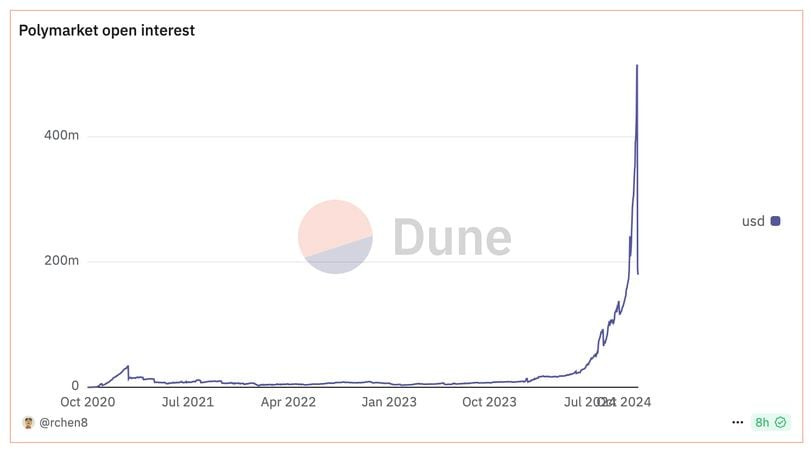Post Election Thoughts
VeradiVerdict - Issue #314
I shared some of my post-election thoughts with Coindesk, Crypto For Advisors
Copy below:
A week after the election, crypto sentiment remains strong. Polymarket, bitcoin and a possibly more efficient and crypto-positive government are all tailwinds to look forward to.
Polymarket
Polymarket, a predictions market built on the Polygon blockchain, saw an explosion of usage leading up to the election, peaking at over $3.2 billion bet on the election, orders of magnitude more than pre-election volumes. Compared to other prediction markets, Polymarket charges no fees, allows seamless trading in and out of positions and is decentralized, meaning anyone can trade directly with the underlying contracts on-chain via the API (allowing for anyone to make trading bots) and anyone from a non-blacklisted geography can access the website frontend.
Though open interest has dramatically fallen post-election, there is a belief that mainstream users have both tried and enjoyed using Polymarket over any centralized entities. One definite win post-election is the discussion of Polymarket’s accuracy by the mainstream media. The Economist, The Wall Street Journal, Forbes, and more have cited Polymarket as the largest prediction market and have used it to judge discrepancies between polls and voting sentiment before and after the election.
Hopefully, Polymarket’s enthusiasm permeates into the broader crypto ecosystem and also inspires more crypto apps to take from Polymarket’s playbook in the pursuit of better usability, abstraction and marketing.
Bitcoin and altcoins
Bitcoin is at an all-time high of over $87,000, pumping to $77,000 right after the election and rising ever since. Altcoins tangentially related to the election also surged, like those on Solana. The Trump Presidency does not directly lead to greater bitcoin buy pressure, but his public support of it was enough to cause a rally in these coins.
Looking forward
Positive headwinds in crypto caused by the election itself may not be as sticky in a month. However, the ramifications of a unified Republican House and Senate majority may mean a more productive government, and one that passes more legislation surrounding crypto.
Crypto election updates from StandWithCrypto
Significantly more pro-crypto than anti-crypto representatives across both sides of the aisle have been elected (266 vs. 120 in the house, 18 vs. 12 in the senate). And pro-crypto Trump may be lighter on crypto regulation or will push crypto-supporting regulation. World Liberty Financial is a crypto project being promoted by Trump and says it will run as an Aave instance (one of the largest DeFi protocols).
What does this mean going forward? First, it may mean lobbying efforts, like those from Ripple and Coinbase, may increase in order to push the wording of crypto regulation in one direction or another.
It is believed that U.S. regulation has been unclear, and clarity would drastically change the thinking around operating in the U.S. The largest crypto venture capital firms are largely still based in the U.S., so allowing the companies that are funded to operate in the country could supercharge the industry, supporting the domestic crypto market.
There has also been excitement from top DeFi protocols like Compound and Uniswap surrounding previously “off-limit” protocol features, like staking, fee-switches and more. Adding regulatory clarity around these features may cause firms to innovate on DeFi protocols.
Overall, I am very optimistic about the direction the crypto industry is heading, especially post-election. A unified House and Senate may bring unexpected wins in an ever-changing industry.
- Paul Veradittakit
DIGESTS
Making Crypto Tokens Useful and Fair
Instead of parsing the Howey Test, founders should prioritize making tokens useful and fair, say Jake Chervinsky and Rebecca Rettig.
How Public Blockchains Will Catalyze Institutional DeFi Adoption
Public blockchains — with their open architecture and unrestricted participation — are set to drive the next wave of financial innovation just as the internet did for communication and commerce, says Markus Infanger.
BUSINESS
Venn Network Aims to Solve DeFi's Hacking Problem With More Decentralized Tech
Creator Or Dadosh says Venn creates a "completely new economy" for crypto security.
Banco Bisa Introduces Bolivia’s First Regulated Crypto Custody Service Using Tether
The service in Bolivia will be available for customers to transfer funds abroad and facilitate payments for family members studying overseas.
REGULATION
FTX CEO Makes Last-Minute Plea for Leniency in Nishad Singh Sentencing
John Ray laid out the importance of Nishad Singh’s future cooperation to FTX’s bankruptcy, hours before the crypto executive's sentencing.
Where are businesses like Binance setting up shop in the emerging crypto centre of Dubai?
DL News' Dubai correspondent navigates the city's crypto's scene. Free zones and regulatory hubs teem with crypto activity.
NEW PRODUCTS AND HOT DEALS
Coinbase, Visa to Allow Real-Time Crypto Deposits Through Debit Card
While millions of users are already using debit cards to connect to their Coinbase accounts, the Visa debit card holders offer near-instant transfers, which wasn’t possible before.
Nil Foundation Names New CEO as Ethereum Layer-2 Scaling Race Intensifies
Avi Zurlo, who took the reins at the Nil Foundation on Monday, will lead initiatives to make zkProofs more accessible for developers on Ethereum and help scale the network through sharding.
LETS MEET UP
Los Angeles, November 26-29
New York City, December 12
Walks and coffee meetings in San Francisco throughout the year!
ABOUT ME
Hi, I’m Paul Veradittakit, a Managing Partner at Pantera Capital, one of the oldest and largest institutional investors focused on investing in blockchain companies and cryptocurrencies. I’ve been in the industry since 2014, and the firm invests in equity, early stage token projects, and liquid cryptocurrencies on exchanges. I focus on early-stage investments and share my thoughts on what’s going on in the industry in this weekly newsletter.



